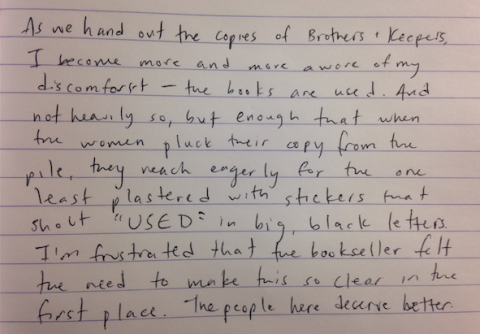My Ecological Intelligence
By aayzahmirzaDecember 5, 2015 - 19:19

Aayzah Mirza
Paper 8
December 5, 2015
Serendip is an independent site partnering with faculty at multiple colleges and universities around the world. Happy exploring!

Aayzah Mirza
Paper 8
December 5, 2015
Please read prior to our presentation. Articles will be discussed as a class.

Schedule for final projects in ESem, Dec. 8 & 10:
Tues., Dec. 8: 11:25-12:45 (Taylor F)
Caitlin and Alison: Bryn Mawr and Haverford
Isabell and Jackie: The shocking “tails” of captive animals
Creighton and Maryam: The message of a museum’s continuing to silence stories (of violence in the colonial past)
[10 minutes discussion]
Paola and Leticia: Latinx break the mold @ BMC

Validating Bodies
We cannot seem to go without analysis in this class, in this 360. We thrive in it; it engenders our thinking about our experiences in the prison within the context of the larger narrative. We need it in order to affirm to ourselves that the affect of our presence, regardless of what our intentions may be, is empowering. In this essay, I explore the true purpose of higher education in prison, the kind of education that I advocate for, and the reasons behind this.
Ideologies of merit, deservingness, and blame embedded within and influencing the prison industrial complex are often entangled with, both physically and mentally, the body. This is a concept that I explored in my earliest Sunday reflection post on September 13th:

I.
I'd like to begin with the course evaluations. Julia will pick up the forms from outside my office and distribute them to everyone. As you probably all know, these evaluation forms are very important: I will read them closely to revise and improve the course; they will also be read by senior faculty when I go up for tenure in a few years. So take your time and please be honest and generous!
II.

In "Arts of Freedom," we began with Claudia Rankine’s Citizen (2014) as a kind of invocation for the entire course. We continued to return to Rankine throughout the semester. Rankine raised the question of what it means to be a citizen in the United States, a democracy that still prides itself on freedom yet also contains within it various modes of subjection and subordination, especially continuing racial domination and the highest per capita rate of imprisonment in the world. Rankine invokes these themes while also crafting what we came to call an art of resistance in the poem itself, a stunning and powerful creative act against the broader structures she details.

Books Are My Internet:
Text as Mutable Technology & Reading as Radical Practice

A Saturday morning reflection on the events of the day before, in the prison.

“The point of living in the epoch of Anthropocene is that all agents share the same shape-changing destiny, a destiny that cannot be followed, documented, told, and represented by using any of the other traits associated with subjectivity or objectivity” (P15).
Latour insists on his conception that what exists in this planet is all animated and we are all protagonists of a geo-story. However he claims that this geo-story has been ruined by human-beings, who are deanimating the whole organism. If we as human-beings ignore other species as “others” those others will be killed, however if we care about them as our “peers” we could progress the way to maintain this ecology.

Gayl Jones places Eva in Eva’s Man in a dysfunctional family, demonstrating how the chilling experiences of sexual abuse Eva struggles with and witnesses around her, frames and influences her later relationships and interactions with men. Jones’ centers an African American womyn's exploration of her fullest and most complex definition of herself in a society that marginalizes and silences her identity and in a culture that devalues her race and gender. Jones addresses how femelle hysteria and irrationality is constructed in the first few sentient encounters a womyn has with the sexist, unjust, and repressive society and specific communities she lives in.

3 December 2015
Treason Can Be Inherited: The Dishonor of Celia’s Crush
This past semester, Bryn Mawr’s Shakespeare Performance Troupe (SPT) put on a production of “As You Like It”, in which I played the role of Celia1. Her character is an interesting one, strangely, not for her dialogue when she is present, but for her silent presence in many scenes. Upon reading Adrienne Rich’s piece “On Lies, Secrets, and Silence”, which argues that “[l]ying is done with words, and also with silence” (Rich 186), I came to interpret her choices in a new way. Through the lens of Adrienne Rich, Celia’s silences are a mark of dishonor, and a betrayal of the person dearest to her, Rosalind.